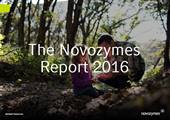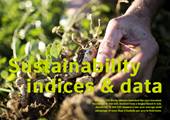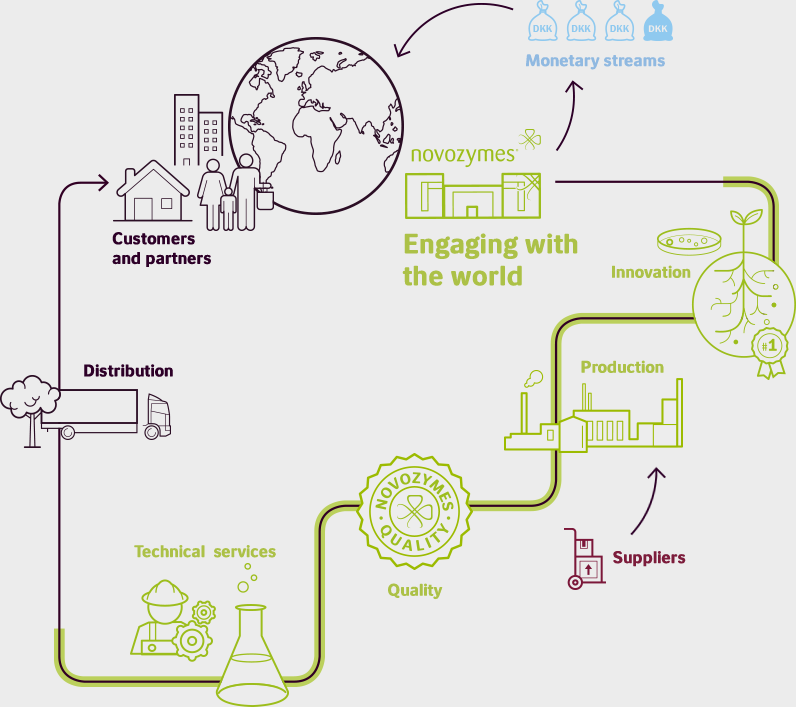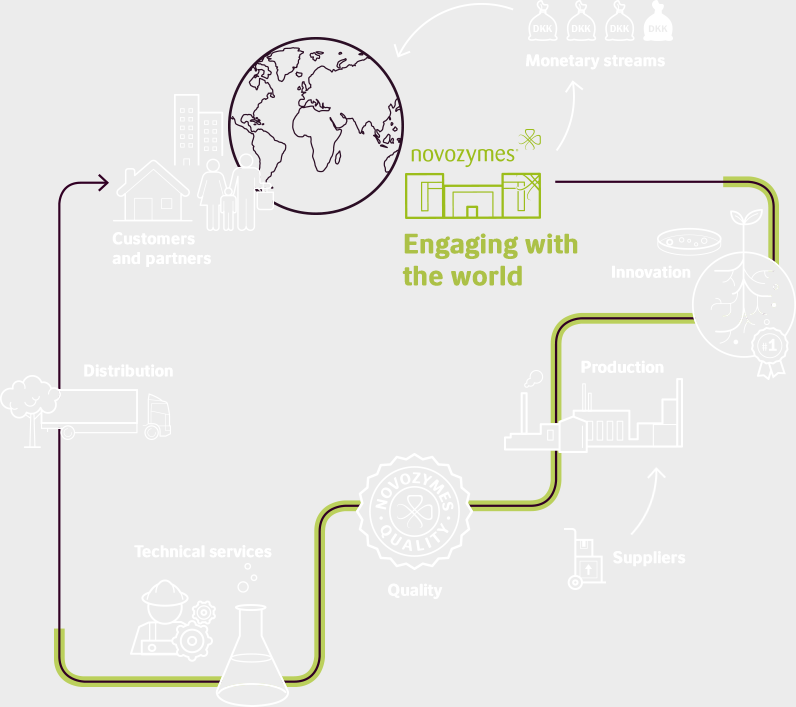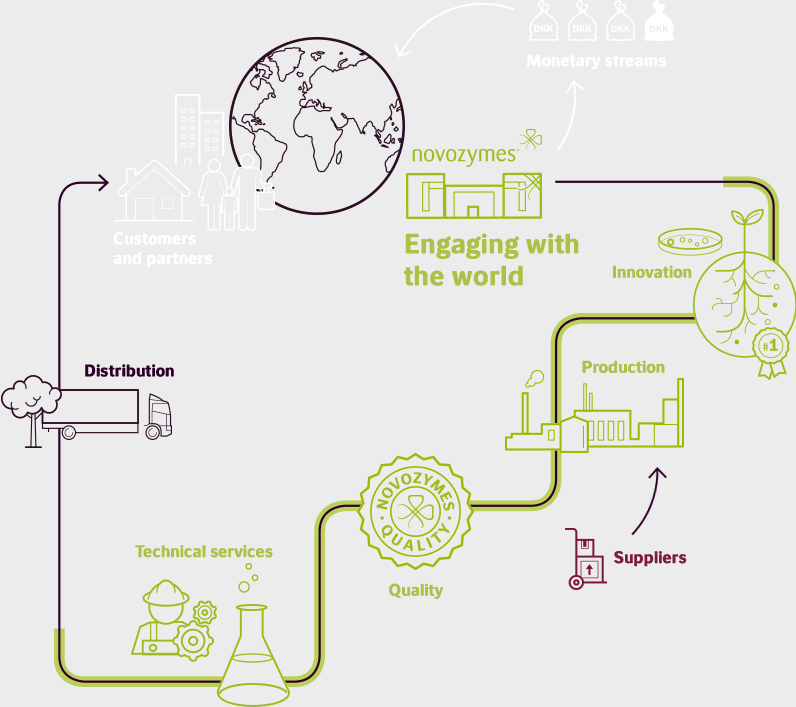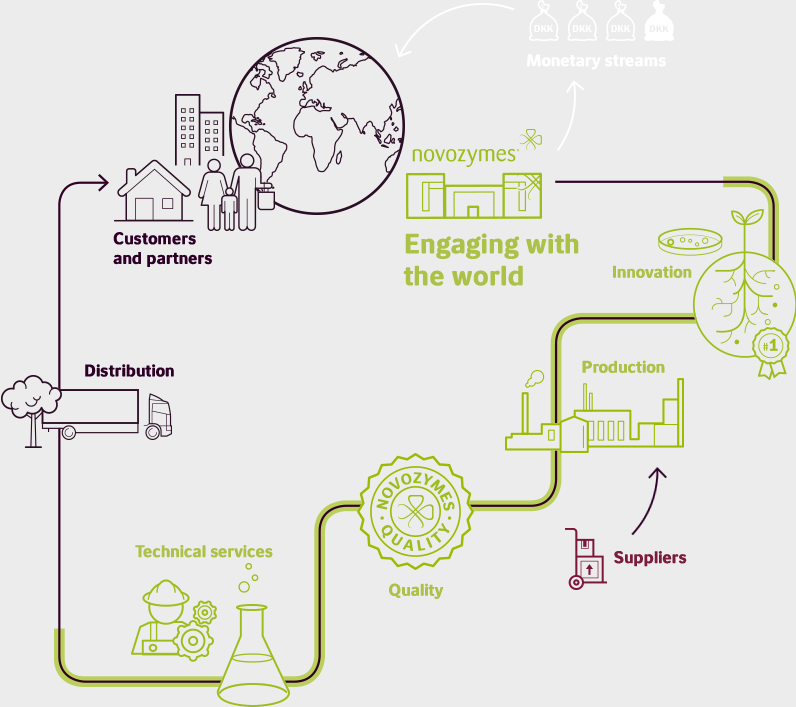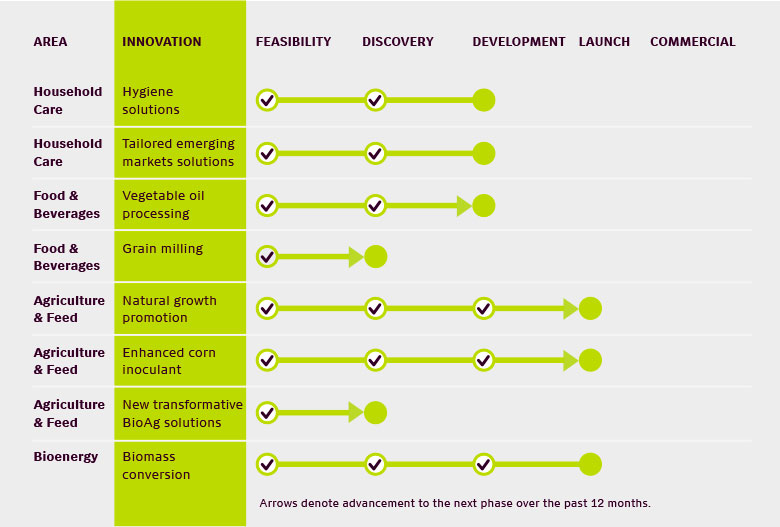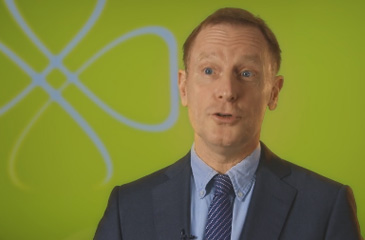Explore our business model and see how we innovate, produce and supply our biological solutions to customers in various industries worldwide.
The SDGs have guided Novozymes’ long-term targets for fulfilling its purpose to find biological answers for better lives in a growing world. To do this, we need to work together with partners such as customers, consumers, suppliers, governments and academia,
and we are required to open up our business model to take in ideas from outside the company. We partner with the UN and other governmental institutions to further sustainability objectives, and with academia to improve and expand fundamental
research. We take part in dialogues on the world’s pressing challenges, develop solutions for some of those challenges, profit from doing so, and then reinvest in finding biological answers.
Novozymes’ solutions are derived from nature. We set out to solve a problem – be it cleaning clothes, breaking down biological material for ethanol or helping animals to stay strong and healthy – based on our extensive knowledge of enzymes and microorganisms.
In fact, when we innovate with enzymes, we screen thousands of microorganisms to find the one that produces the enzyme with the exact characteristics we need for a specific product.
Most of Novozymes’ products take between two and five years to go through the innovation pipeline from idea to market, but can sometimes take less than a year (e.g. in Bioenergy) or more than five years. For some industries, especially within
food and feed products, there is a lengthy regulatory process before a product can be sold commercially. Novozymes also continuously updates and reinnovates its product portfolio to maintain product value and generate new patentable innovations.
In 2016, we established a new Portfolio Board to manage the R&D pipeline across Novozymes’ divisions. This board evaluates all of the projects in the pipeline based on a number of criteria, including strategic impact, financial impact and
contribution to delivering on the SDGs. That way, we ensure that the innovations we bring to market are in line with our long-term targets and purpose. This way of working is not entirely new to us: Environmental and social issues have long
been a consideration in how we set priorities, and we have many years’ experience of using life cycle assessments (LCAs) successfully to scale our research and measure the effect our biological solutions have on the environment.
Once our innovation teams have tested and prepared an enzyme for an industrial processes, we apply that enzyme to a set of fast-growing microorganisms – our “workhorses” as we call them. Microorganisms produce enzymes, and an important part of our production
process is to identify the microorganisms that produce the exact enzymes we need for each production process. One microorganism only produces a grain of sand’s worth of enzymes, and industrial processes often require an entire beach. To produce
these vast amounts of enzymes, we make the microorganisms multiply using fermentation. Having recovered the enzymes after the fermentation process, we prepare them for use by our customers. Our global production setup enables us to do this
wherever the necessary technology and skills are available. Currently, we produce our enzymes at eight plants across four continents.
Through an efficient supplier management system, Novozymes ensures that its suppliers balance reliability, quality and efficiency with a passion for sustainability and innovation. We partner closely with them in efforts to innovate and implement responsible
solutions that have an impact on the world.
The ability to anticipate and understand customers’ present and future needs allows Novozymes to deliver high-quality biological solutions. At Novozymes, quality is more than product quality; it also covers processes and services related to how we do
business with our customers. Continuous surveillance and improvement are integrated components of Novozymes’ quality system and the cornerstone of how we advance the services we offer to customers.
When solutions are ready for application in customers’ value chains, Novozymes’ technical service teams help them adopt each innovation smoothly to ensure the expected value and effect are delivered. These teams work on the ground at customer sites to
make Novozymes’ biosolutions a success in the specific environment where they are used. These implementation taskforces innovate for our customers as their technical experts, problem-solvers and advisers. For instance, our technical service
teams help customers replace other inputs with an enzyme solution or perform troubleshooting at the customer’s production facilities. They also adjust enzyme combinations to suit local recipes, for instance in the brewing and baking industries.
Technical service teams are used more extensively in some industries than others, depending on the complexity of the production process at a customer’s plant.
Our technical service teams set us apart from competitors because they are able to optimize the use of our products and make the necessary adjustments to maximum effect for the customer. Working closely with customers, they combine Novozymes’
global R&D capacity with deep industry experience to bring customers new value. The knowledge gained from interaction with customers also feeds back to our product pipeline and helps future innovations, so together we can evaluate our progress
and rethink tomorrow.
The distribution of Novozymes’ products to customers depends on industry dynamics. Within Agriculture & Feed, distribution is conducted by our partners in the industry, Monsanto, DSM and Adisseo, as they are responsible for the commercial aspects of our
partnerships in addition to testing and regulatory aspects. In Bioenergy and Household Care, most distribution is direct from Novozymes to customers. In Food & Beverages and Technical, markets are more fragmented, and we therefore have a more
mixed distribution setup.
Using Novozymes’ enzymatic or microbial solutions, customers save on costs and minimize the environmental footprint of their production by reducing or substituting raw materials, saving resources and energy, or by improving product quality. By partnering
closely with our customers, we gain a better understanding of their needs and challenges. In turn, we help them improve their businesses by providing new insights and innovations that help them achieve their goals. Our integration with customers
does not stop with innovation. In Household Care, for example, we have also begun working with key customers’ commercial teams on branding, where our solutions provide a unique selling proposition that sets them apart from their competitors.
We help our customers to understand the value our solutions bring to their products and the benefits consumers will experience.
In line with its strategy “Partnering for Impact,” Novozymes partners closely with other companies, such as Monsanto in The BioAg Alliance and DSM in animal feed. These partnerships benefit from Novozymes’ strong innovation skills and manufacturing/fermentation
expertise, as well as our partners' key skills in areas such as screening, testing, data processing and commerzialization and make it possible to meet customer and consumer needs more effectively. Partnering with other companies gives Novozymes
the opportunity to explore and enter into new business areas faster and more efficiently. For example, partners such as Monsanto can move large volumes through their network of distributors, providing Novozymes with a greater reach, enabling
us to bundle more solutions and integrate these later in the customer value chain.
Novozymes’ revenue comes from sales of products – enzymes and microorganisms. Technical services are included in the price of the product. Around 13% of revenue is reinvested in R&D, benefiting both product innovation and production economy. Novozymes’
most significant cost drivers are direct production costs, R&D and technical services. In terms of shareholder remuneration, Novozymes has a target dividend payout ratio of around 40% and conducts regular share buyback programs to provide
a return for investors.
